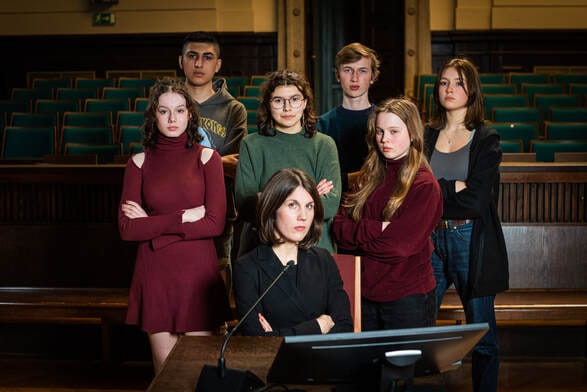Austrian Youth Take Their Government To Court Over 'Ineffective' Climate Policy

Story originally published in DeSmog
Austria is the latest country to be facing a lawsuit brought by some of its youngest citizens who say their government is failing to protect them from the worsening climate crisis.
Backed by the Austrian chapter of the youth climate strike organization Fridays for Future, a group of 12 children and adolescents launched a landmark constitutional climate case against the Austrian government on Tuesday. The case specifically challenges a 2011 climate protection law, claiming it is ineffective and outdated, and therefore infringes upon children’s constitutional rights.
“For years, Fridays for Future has been demanding the revision of the Climate Protection Law in order to (finally) establish compliance with the Paris Agreement. However, since the Climate Protection Law remains ineffective to this day, twelve children are now going to court and Fridays for Future is supporting them,” Michael Spiekermann, an activist with Fridays for Future Austria, said in a statement.
Young people around the world are increasingly turning to the courts to challenge their government’s climate policies or responses. Climate experts confirm these measures are inadequate given the large gap between countries’ climate pledges and policies, and the action needed to achieve the objectives of the Paris Agreement.
Many of these youth-led climate lawsuits invoke constitutional or human rights claims. In the United States and Canada, for example, youth are suing their federal governments on constitutional grounds. Those cases do not challenge a particular policy but rather allege that the government’s systemic actions pertaining to climate and energy endanger young people’s fundamental rights, as the climate crisis intensifies over time.
Outside of North America, youth have filed climate lawsuits in a number of other countries, from South Korea to Sweden. In November, Greta Thunberg announced she was joining more than 600 other Swedish youth in a class action case against her home country. Later this year, a groundbreaking climate case filed by six Portuguese youth against 33 European countries will come before the European Court of Human Rights. And in April 2021, Germany’s Federal Constitutional Court decided in favor of youth in a case challenging Germany’s Climate Protection Act. The court found parts of that law to be unconstitutional for failing to sufficiently protect the rights of youth and future generations.
The latest youth climate case against Austria is most similar to the German case. It likewise challenges the state’s Climate Protection Act on constitutional grounds. Specifically, the case contends that the law fails to protect youth because it lacks updated emissions reduction targets, among other deficits. Michaela Krömer, lead lawyer for the Austrian youth plaintiffs, said that the case has a solid legal foundation because the rights and protection of children, including intergenerational equity, are enshrined in Austrian constitutional law.
“The Austrian constitution grants children very special fundamental rights. These rights unequivocally stipulate that the well-being of children must be protected also in terms of intergenerational justice,” Krömer said in a statement. “Children thus have a right to active protection against the consequences of the climate crisis. A Climate Protection Law which lacks greenhouse gas reduction targets, clear responsibilities and an accountability mechanism clearly infringes these constitutional rights.”
But while Germany’s climate law, passed in 2019, included an emissions reduction target for 2030, Austria’s policy — enacted in 2011 — does not cover emissions reductions beyond 2020. Furthermore, according to Fridays for Future Austria, the mitigation actions that are covered under the policy lack verification measures, or methods to ensure their effectiveness. The new lawsuit seeks to have the court strike out parts of the law as unconstitutional and prompt the government to pass a new, more effective climate law.
DeSmog reached out to Austria’s Federal Ministry for Climate Action, Environment, Energy, Mobility, Innovation and Technology but did not receive an immediate response.


